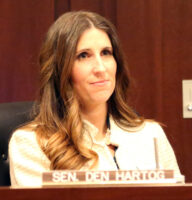MERIDIAN — Members of the Idaho Office of School Safety and Security advisory board and school security analysts again pushed back against schools chief Sherri Ybarra’s school safety plan Thursday.
And after an hour of tough questions, Rep. Wendy Horman told Ybarra’s staff to remove the school security office’s logo from the state superintendent’s school safety web page.
“I don’t want to imply this board was aware of until today or endorsed anything in (Ybarra’s) proposal,” said Horman, R-Idaho Falls, the chairperson of the school security office’s advisory board. “I would ask that this is known as a State Department of Education initiative for now.”
Days later on Monday morning, Ybarra had not yet removed the logo from her website.
Thursday’s meeting represents the latest pushback against Ybarra’s Keep Idaho Students Safe plan, a prominent proposal as Ybarra faces a re-election challenge in November. Ybarra unveiled her multimillion dollar Keep Idaho Students Safe plan at the end on the 2018 legislative session. But the Office of School Safety and Security and leaders of three education groups said Ybarra never reached out for help in developing her plan.
The Legislature and Gov. Butch Otter created the Office of School Safety and Security in 2016. Office analysts have visited about two-thirds of Idaho’s school campuses, developing personalized security assessments for each site.
But on Thursday, most of the scrutiny was directed at Ybarra’s KISS initiative.
Sen. Lori Den Hartog was skeptical of the most expensive aspect of Ybarra’s plan — an $18.5 million grant program to pay for trained security presence, a guard or security upgrades in each school. Den Hartog said high administrative costs would be “baked” into a grant program.

“I feel like we’re creating a job or a position for sole purpose of applying for taxpayer dollars that are already supposed to go to education,” said Den Hartog, R-Meridian, an advisory board member.
Board members and members of the audience also appeared skeptical about Ybarra’s budget request, which calls for no grant funding in 2019-20. This suggests Ybarra is seeking one-time money at a time when emergency responders say schools face ongoing safety needs.
“I would rather see the $18.5 million spread over five years,” said Pocatello Fire Chief David Gates, another advisory board member.
Instead of having Ybarra dole the money out in grants to each school for “a lower-level $25,000 paid training guard” or whatever other needs administrators see fit, Gates suggested basing grants on the school safety office’s site assessments.
Finally, Gates echoed a recurring criticism — expressing regret that Ybarra’s team did not come to him sooner.
“I would like to have seen this a little bit more ahead of time so we could have sorted a lot of this stuff out,” he said.
Not all the feedback was critical.
Logan Easley, an advisory board member and elementary school teacher in the West Ada School District, expressed support for including school safety training in the teacher recertification process.
And Idaho Association of School Administrators Executive Director Rob Winslow said his members have been asking for additional funding for security upgrades, such as video cameras, working public address systems or new door lock systems. Winslow said one-time grants could be valuable in that regard, but he expressed concern about asking districts to hire personnel — an ongoing expense — with one-time money.
During the morning portion of the meeting, Meridian police Lt. Shawn Harper discussed how he has worked with virtually every law enforcement agency, emergency services responders and school in Canyon and Ada counties to create a coalition working on school safety. Harper is hoping to forge alliances, focus on preventative measures, develop a common vocabulary that everyone could understand in an emergency and begin to implement a common set of emergency responses.
Other school districts and law enforcement agencies from outside the Treasure Valley have joined the effort as well, he said. In the end, Harper is pushing for a plan that every school child and teacher will understand, so there is no confusion on how to respond if a first-grader moves from West Ada to Idaho City during the middle of the year.
“What we found out is that we’re doing a lot of the same things, but use different terminology,” Harper said.
Ybarra did not attend Thursday’s meeting, but her Democratic opponent, Cindy Wilson, did. Others in the audience included House Education Committee Vice Chairman Patrick McDonald, R-Boise, Winslow, leaders of the Idaho School Boards Association, Otter’s education liaison Marilyn Whitney and a handful of Ybarra staffers.
The Office of School Safety and Security’s next advisory board meeting is scheduled for Dec. 13 — just before the opening of the 2019 legislative session, when school safety and school funding are expected to be major issues.
